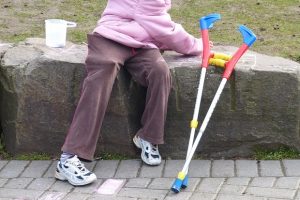High-risk prescribing practices associated with increased risk of disability among older adults

For many, good health and longevity is only achievable with the help of prescription drugs. However, researchers in Japan have recently identified that some "high-risk" prescribing practices may be a cause for concern among older adults.
In a new study published in Geriatrics and Gerontology International, a research team led by the University of Tsukuba evaluated the relationship between high-risk prescribing practices and the risk for disability in people aged 65 years and older. High-risk prescribing practices include polypharmacy (the use of five or more prescription drugs) and the use of drugs with sedative or anticholinergic properties, including antipsychotics, benzodiazepines, and antiparkinsonian drugs.
High-risk prescribing practices have been previously shown to be associated with physical frailty among older adults, and physical frailty corresponds with a risk for physical disability. In Japan, people who are aged 65 years and older and have a functional disability are eligible to receive long-term care (LTC) services. To receive these services, a LTC needs certification is granted based on the assessment of an applicant's eligibility and care requirements. Using LTC needs certification as a proxy for disability among older adults in Japan, researchers led by the University of Tsukuba conducted a population-based nested case-control study to determine whether high-risk prescribing practices are associated with an increased risk of disability.
To conduct our analysis, we used two health insurance datasets to form a comprehensive cohort that included 89% of Japanese adults aged 65 years and older as of October 2018."
Dr. Naoaki Kuroda, lead author
Among the cohort, the research team identified and control-matched over 2,100 cases who received their first long-term care needs certification within the observation period. The researchers then used conditional logistic regression analysis to estimate the risk of LTC certification associated with high-risk prescribing practices.
"We found that both polypharmacy and the use of drugs with sedative or anticholinergic properties exhibit dose-response relationships with the risk for LTC needs certification," says senior author Professor Nanako Tamiya. "In other words, these high-risk prescribing practices are associated with an increased risk of disability among older adults."
The findings of this study may encourage the development of public health initiatives regarding high-risking prescribing practices among older adults. Additional research is needed to determine whether a reduction in high-risk prescribing practices corresponds with a reduction in the risk of disability.
University of Tsukuba
Kuroda, N., et al. (2022) Associations of polypharmacy and drugs with sedative or anticholinergic properties with the risk of long-term care needs certification among older adults in Japan: A population-based, nested case–control study. Geriatrics and Gerontology International. doi.org/10.1111/ggi.14393.
Posted in: Medical Research News | Healthcare News | Pharmaceutical News
Tags: Anticholinergic, Disability, Drugs, Geriatrics, Gerontology, Health Insurance, Medicine, Public Health, Research, Sedative
Source: Read Full Article




